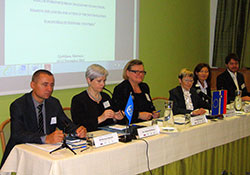South-eastern Europe Health Network discusses health workforce issues

Ministry of Health, Slovenia
Members of the South-eastern Europe Health Network (SEEHN) met in Ljubljana, Slovenia on 10–11 November 2014 to share country experiences and lessons learnt in addressing health workforce challenges in Europe.
The workshop entitled “Health workforce from challenges to solutions – Shaping the agenda for action in the SEEHN countries” was co-sponsored by Slovenia’s ministries of foreign affairs and health and by WHO/Europe’s Technical Programme on Human Resources for Health (HRH).
The workshop focused on:
- health workforce mobility;
- development of an SEEHN strategy and action plan on strengthening human resources for health (2014–2020) in line with the SEEHN Decision and the SEE 2020 Strategy; and
- technical collaboration and knowledge exchange on human resources for health within SEEHN countries and relevant partners.
Speakers at the conference included Ms Milojka Kolar Celarc, Minister of Health; Ms Blažka Kepic, Head of the Department for International Development Cooperation Implementation, Ministry of Foreign Affairs; Dr Marija Ruseva, Co-opted member of the SEEHN Executive Committee; and Dr Marijan Ivanuša, Head of the WHO Country Office in Slovenia.
Background
A sustainable and well-performing health workforce is the backbone of an effective health system. The need to address health workforce challenges in countries and introduce mechanisms to improve and promote relevant health workforce policies is well recognized and stands high on the political agenda of all SEEHN Member States.
A commitment to health workforce development has been reaffirmed by several SEE ministerial fora. In 2013, the SEEHN Regional Health Development Center on Human Resources for Health (SEEHN Health Workforce Observatory) was established, hosted by the Republic of Moldova. Strengthening human resources for health has also been identified as one of the key strategic actions of the health dimension in the Inclusive Growth Pillar of the recently approved SEE 2020 Strategy “Jobs and Prosperity in the European Perspective.”
Support from WHO/Europe and the European Commission
WHO/Europe and the European Commission’s TAIEX Programme have also organized and convened several technical meetings for policy-makers and researchers from SEEHN countries:
- to contribute to available evidence on health workforce in the Region;
- to facilitate exchange of information and experiences gained in Member States, and
- to strengthen national capacity in addressing health workforce challenges.



